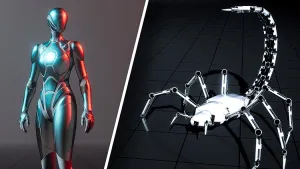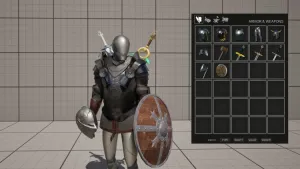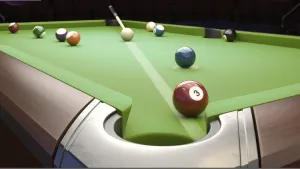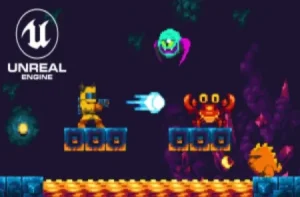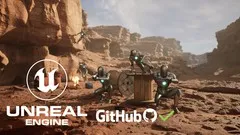Learn Control Rig within Unreal Engine 5 to create procedural animation systems.
What you’ll learn
- Learn the fundamentals of ControlRig for Unreal Engine 5
- Create a procedural walk animation system
- Create a procedural turn-in-place animation system
- Learn various techniques to add dynamic motion to your character animations
- Master ControlRig functions, variables and logic, and how to incorporate it into your project
- Learn problem solving and debugging
- Learn how to turn your idea from a concept into a working system
- Gain an expert understanding of ControlRig’s capabilities for use in your single & multiplayer games, videos and animations, UEFN projects and more
Requirements
- No Unreal Engine skills or animation skills are required. This course takes you through every step, starting very slowly and gradually increasing in complexity until you fully master ControlRig for procedural and dynamic animations.
Description
In this course you will learn to use Control Rig in Unreal Engine 5, with a focus on creating procedural animation systems.
This course is suitable for complete beginners, all the way through to professional animators and experienced game developers. It begins very slowly with detailed explanations and instructions to take you through creating procedural animation systems, which gives us a chance to explore and become familiar with various features of Control Rig.
After creating a procedural walk system, we take a general look at some useful features of Control Rig, and experiment with systems that allow you to create characters that interact with the environment and move realistically.
And finally we will create a procedural turn in place animation system, including troubleshooting, tweaking, and working through the logic step by step.
The project file includes the completed versions of everything we create for Unreal Engine 5.2 and 5.3. This will be updated to include a 5.4 version when that version of the engine releases.
The techniques and methods explored are suitable for single player and multiplayer projects. The techniques used within Control Rig are also suitable for UEFN. This applies to the fully procedural sections and the specific functionalities we explore inside of Control Rig (at the time of writing animBP access is not available in UEFN, preventing a combination with keyframed animation – but the majority of the concepts will still work).
This information in this course is not available elsewhere, and is the result of many years of experimentation with Control Rig and procedural animation systems. My goal was to condense all of my experience with Control Rig into an easily digestible and understandable course, with explanations and diagrams at every step, so that you can learn a full mastery of how to use Control Rig for your own procedural and dynamic animations.
I look forward to seeing you on the course, and for you to share your creations and ideas. I’m always available for a discussion of concepts/ideas/help with any project, even if your specific use-case isn’t covered directly in this course.
Who this course is for:
- Game developers looking to add procedural animations to their project.
- Animators who want to make their animations more dynamic and interactive.
- Anyone who is curious about procedural techniques and the future of real-time animation
Click the button below to download.
Download:
